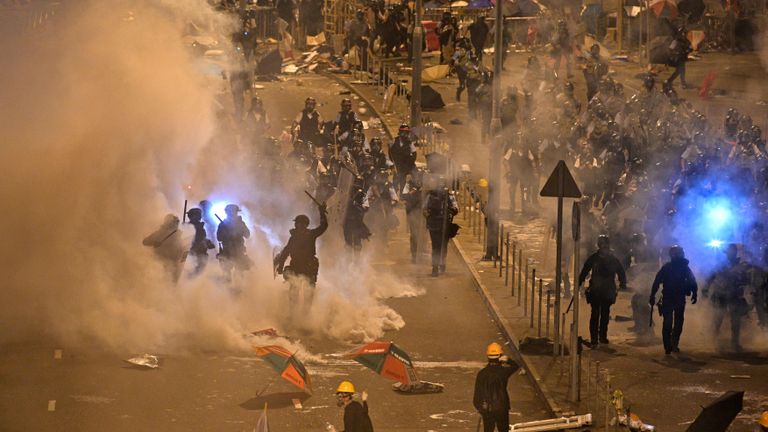Hong Kong protests: Riot police fire tear gas to take back control of government building
Protesters broke into the legislature's main building, tearing down portraits and spray-painting pro-democracy slogans on walls.
Tuesday 2 July 2019 09:22, UK
Police in Hong Kong have gained back control of a government building by firing tear gas and charging at demonstrators after protests turned violent.
Calm descended on the city hours after police fired tear gas to disperse hundreds of protesters who had stormed the legislature to protest against an extradition bill in a direct challenge to Beijing.
Police cleared roads near the heart of the financial centre, paving the way for business to return to normal.
However, government offices remain closed this morning.
Demonstrators had broken into the legislature's main building before hundreds more swarmed in, tearing down portraits and spray-painting pro-democracy slogans in the main chamber on Monday afternoon.
The three-hour occupation came on the 22nd anniversary of the former British colony's return to China, and reflected mounting frustration with Hong Kong's leader for not responding to protesters' demands after several weeks of rallies.
Police initially retreated and gave the protesters the run of the building before announcing a crackdown.
Soon after, hundreds of officers lined up outside the government building carrying riot shields and wearing goggles and breathing apparatus.
Police tried to wrestle back control by charging at protesters, who were sheltered under umbrellas, warning that "appropriate force" would be used.
:: Listen to the Daily podcast on , , ,
There was a standoff for some time between the police and protesters, with neither side wanting to give up their positions close to the legislative building.
Police fired tear gas at protesters, with several canisters exploding in the crowd before officers moved forward again to try and finally break up the protest.
Officers approached the building shortly after midnight local time and entered the legislative chambers after protesters had already left.
There were no immediate reports of injuries or arrests, however arrests are expected.
The protests turned violent when demonstrators wearing hard hats and face masks smashed a large hole through the bottom of a floor-to-ceiling window at the government building and pried open steel security gates.
Demonstrators stood on politicians' desks and painted over the territory's emblem on a wall, while Hong Kong's old British colonial flag was also hanged.
The crowd also wrote slogans calling for a democratic election of the city's leader and denouncing the extradition legislation which first sparked the protests last month.
The extradition proposal has heightened fears of eroding freedoms in the territory, which Britain returned to China on 1 July 1997, and debate on the measure has been suspended indefinitely.
Frustrations have mounted among protesters, who want the bills formally withdrawn and Hong Kong's embattled leader, Carrie Lam, to stand down.
Ms Lam, who was not directly elected, has faced criticism for trying to push the legislation through and pledged to be more responsive to public sentiment.
In a 4am news conference, Ms Lam condemned protesters who broke into the city's legislature and vandalised the building.
She said: "This is something that we should seriously condemn, because nothing is more important than the rule of law in Hong Kong.
"So I hope the community at large will agree with us that with these violent acts that we have seen, it is right for us to condemn it and hope society will return to normal as soon as possible."
Earlier, Amnesty International's spokesman in Hong Kong, Man-Kei Tam, told Sky News that Ms Lam should "come out right now to announce the official withdrawal of the bill" if she is "a responsible and conscientious leader".
Meanwhile, the leader of the pro-democracy group that organised Monday's march, Jimmy Sham, said Ms Lam had not responded to their demands because she is not democratically elected, and is chosen by a committee dominated by pro-China elites.
"We know that Carrie Lam can be so arrogant," Mr Sham told the crowd. "She is protected by our flawed system."
Protesters also want an independent investigation into whether Hong Kong's police force used heavy-handed tactics during violent protests on 12 June over the extradition bills.
Officers used metal batons, pepper spray, tear gas, beanbag rounds and rubber bullets in clashes with protesters outside the legislature building.
Chinese media outlets have barely reported on the protests since they began last month, other than to blame foreign forces for stirring up unrest. Mainland China's state-controlled media made no mention of Monday's protests.
The controversial extradition legislation has also drawn opposition from the legal profession, commercial groups and foreign nations.
US National Security Adviser John Bolton said on Monday that Washington expects "China like every other country to adhere to its international obligations" regarding Hong Kong.
China rejects all such statements as foreign interference, with Chinese foreign ministry spokesman Geng Shuang telling reporters: "Hong Kong affairs are purely China's internal affairs, and no foreign country has the right to intervene."














